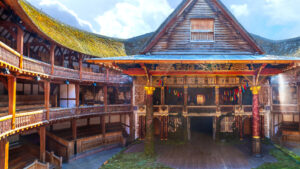
We have a long-ago ancient ancestor, King Duncan I of Scotland, a relatively obscure and ineffectual king who reigned a millennium ago from 1032-1040. He was killed at the Battle of Bothnagowan on August 14, 1040, by an army led by Mac Bethad Mac Findláich (Macbeth in English), allowing Macbeth to assume the crown of Scotland. It is believed that Macbeth and Duncan were cousins, and that Macbeth did have a legitimate claim to the Scottish throne.
This long-ago bit of Scottish history might have remained forgotten but for the fact that the rivalry was immortalized 600 years later in one of the greatest works of English literature.
Shakespeare’s “Macbeth”
Shakespeare wrote “Macbeth” sometime between 1604-1606 when King James I and James VI of Scotland ascended to the throne. Shakespeare probably learned the story of the Scottish King Duncan from a 1587 tome, “The Chronicles” by Holinshed, a history of England, Scotland, and Ireland familiar to Shakespeare and his contemporaries. It is thought that the play was meant to please the King by portraying Duncan as a strong, wise and elderly king, murdered by the upstart Macbeth, prodded on by Lady Macbeth.
The true story was quite the opposite: Duncan was a young, relatively weak king who made several unsuccessful attempts to expand his kingdom, including his final attack against Macbeth’s realm of Moray. Macbeth was a more effective king. His 17 year reign was relatively peaceful, and he was even able to go on a pilgrimage to Rome in 1050.
Also, Shakespeare’s Macbeth was Thane of Glamis but Glamis was not a thanage in the 11th century. So Shakespeare’s use of that title for Macbeth might be said to have been… ficthanal!
Lineage to King Duncan I
King Duncan I is a common ancestor of the Mullins family (the lineage passes back through Elizabeth Johnston, to King Robert III of Scotland, to King Duncan) and of the Bonner family (the lineage passes through Nancy Bates to Sir Robert Fitz Walter, Baron of the Magna Carta, to King Duncan).
